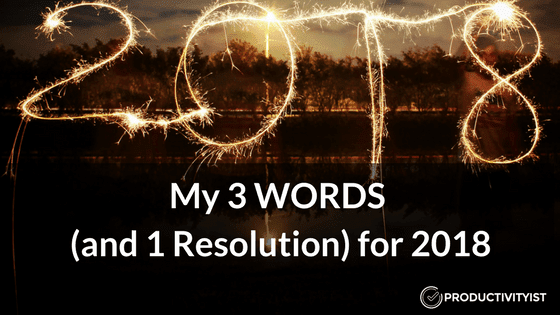
There are several reasons why this post nearly didn’t get written.
First, I don’t usually make resolutions to start off the year. Second, I don’t begin my year in January. I also don’t find yearlong resolutions to be helpful – there are numerous studies that outline how resolutions often don’t work.
So this year after I went through the Yearly Words exercise – something I feature in my “anytime” annual planning program The NOW Year Action Plan Course – I decided to use the same three words from 2017 in 2018.
However, I did change my stance on resolutions. I decided to make one resolution for this calendar year: To be more resolute.
I’m going to be more resolute with my Monthly Themes, ensuring that I give them my overarching focus during those 28-day to 31-day spans of time.
I’m going to be more resolute with my Weekly Sprints, seeing that they override the Monthly Theme and allowing me to focus intensely on the subject of the sprint over the 7 days of the week.
I’m going to be more resolute with my Daily Themes, aligning tasks with each of them so that every day has a greater sense of flow and purpose because they are defined and designed.
I’m going to be more resolute with my Horizontal Themes, making them consistent and stationed in a way that things like fitness and writing get attention as often as I know they should.
And I’m going to be more resolute so that my 3 Words for the year have staying power over the long haul because there were times in the previous twelve months that they did not.
The Same Words
As I sat down to work through my words for the year (a practice I’ve adopted from Chris Brogan over the years), I followed my usual practice where I distill a mission and/or vision statement for a 12-month cycle down to three simple, yet engrossing, words.
These words are engrossing in that they should be able to contain smaller words inside of them. For example, in 2014 one of my words was Focus. That word can apply to personal and professional goals and projects (and ideals, for that matter). It can also contain other words like Clarity and Awareness, among others. Ultimately, Focus won out because it simply “felt right” over and above other words. It sat alongside Family and Forward as my Three Words for 2014 – and even those other two words could arguably cover a wide gamut of other words.
When I started reviewing my possible words for the year ahead (which I did back in August for a September start date), the words Redesign, Rebuild, and Reclaim kept coming back to the forefront. It’s as if they had some unfinished business left to attend to and they weren’t ready to go away like their predecessors.
I struggled with this initially, trying to find other words that could represent them in a new and fresh way. I even considered deviating from my usual pattern of having all three words begin with the same letter.
Redesign could be Upgrade, Renew, or Reset. Rebuild could be Self-Care, Attention, or Service. Reclaim could be Improve, Challenge, or Cultivate. Those alternatives arose simply from a thesaurus search. They also could include virtues such as Integrity, Industry, Tranquility, and more.
But ultimately the incumbent words won out.
I felt as if the words were right: they had unfinished business. I’m still in the process of redesigning, rebuilding, and reclaiming. It’s not something that I believe I could have done in 365 days. In fact, I think the elements of those words – the things they represent – have a much longer shelf life than that.
The Value of Reflecting on Your Words
I’m glad that I go through this exercise every year. Even if I chose the same words as last year, there is value in taking time to both inspect and reflect.
It reminds me of how my son Colton counts his money every week.
Every week he gets a small allowance, and he adds it to his wallet. But before he does that, he takes the time to count its contents. He does that every week, without fail. It’s not as if he isn’t capable of adding the numbers together; he’s quite good at math. He also has an excellent memory – which we’ve become acutely aware of – so it’s not that, either.
He simply wants to see everything in front of him again as he adds something new to the mix.
He likes to see it all in front of him as he adds a little bit more to the pile. Then he totals it up and starts thinking about what he could do with it. He starts to do some of the math for some of the toys he might want to buy, figuring out if it will work or if it won’t. He thinks about how long it took him to acquire this money and starts to figure out how long it will take to buy the toy he wants.
I think that taking time to figure out what words you will use to guide your year – and even beyond – it’s a lot like that.
You need to revisit them regularly so that you don’t lose sight of them. They need to be something you can build upon so that you can make great things happen for yourself and those around you. You need to make sure that they are getting the attention they deserve so that you can use them to help you with your intentions.
So no matter what words you choose for yourself, make sure you find a way to keep them in front of you so that you can be more resolute with them going forward.
Do that and, as the late legendary football coach Bill Walsh said, “the score will take care of itself.”

